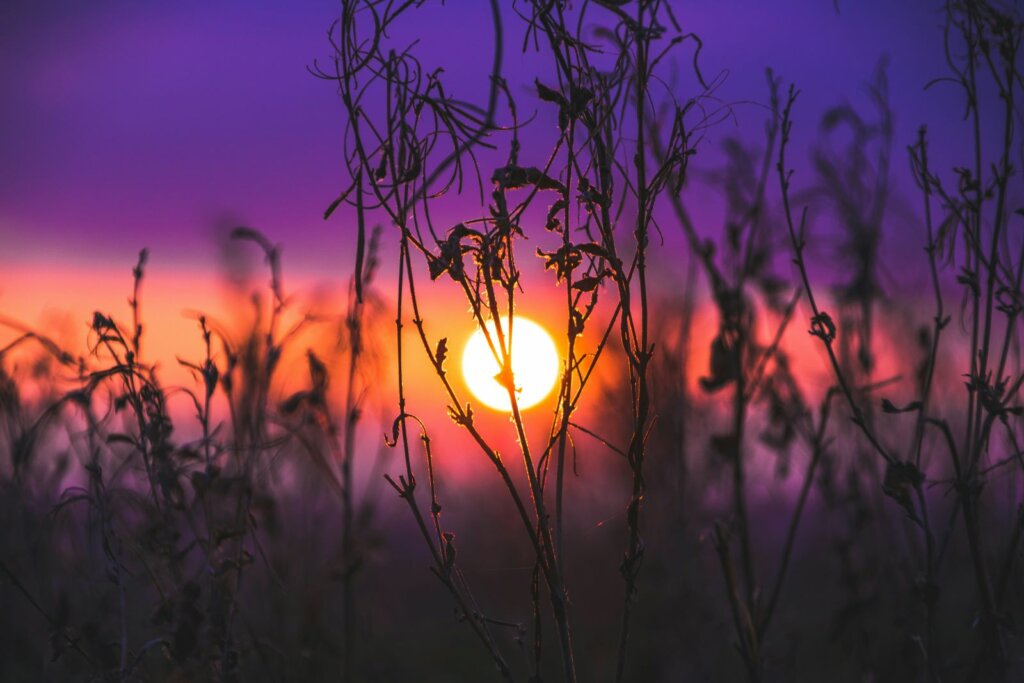It’s a weird time to be Jewish and to celebrate Hanukkah, which commemorates a military victory. I’m still lighting the candles with my friends and family but the whole thing has me contemplating many things: how to be in the world, what I think, why it matters, and who is listening.
If I listen to people in the digital world, everything seems terrible. I don’t only mean the active wars. People are saying spiteful things during presidential debates. They’re presenting polarizing views and shooting for the lowest common denominator rather than higher ideals. If I only focus on the digital world, I get depressed. But in the physical world, things aren’t so bad depending on where you live.
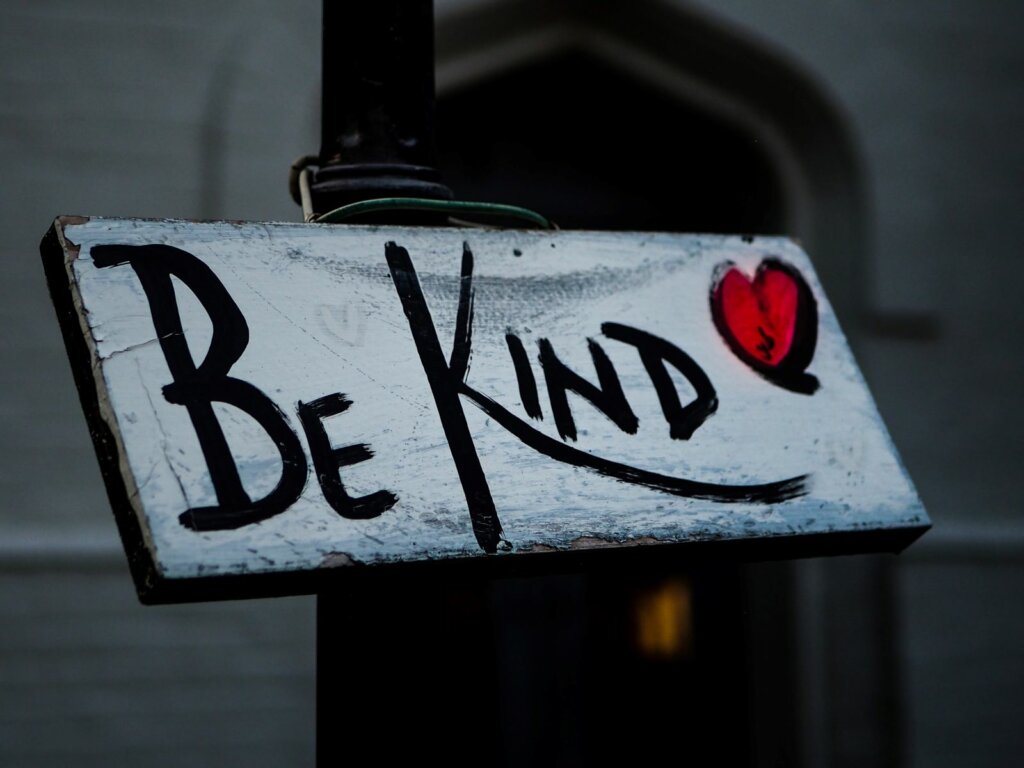
The sign says it all. Photo by Adam Nemeroff on Unsplash
In the physical world, people say, “Hey, is that your umbrella?” when they notice one left behind on a train seat. In the physical world, strangers smile at each other. In the physical world, good Samaritans help elderly ladies carry their walkers up bus steps. It reminds me of a poem by Danusha Laméris called “Small Kindnesses” that I’m quoting a portion of:
I’ve been thinking about the way, when you walk
down a crowded aisle, people pull in their legs
to let you by. Or how strangers still say “bless you”
when someone sneezes, a leftover
from the Bubonic plague. “Don’t die,” we are saying.
And sometimes, when you spill lemons
from your grocery bag, someone else will help you
pick them up. Mostly, we don’t want to harm each other.
We want to be handed our cup of coffee hot,
and to say thank you to the person handing it. To smile
at them and for them to smile back. For the waitress
to call us honey when she sets down the bowl of clam chowder,
and for the driver in the red pick-up truck to let us pass.
That’s my experience of the physical world. That mostly we don’t want to harm each other. That usually we see one another as human beings and say, “Here, let me make things a little easier for you.” It’s that genuine care and love for humanity that solves problems great and small, according to my spiritual teacher.
“This love will give people guidance; it will show them what to do and what not to do,” he said. “It is not necessary to study great numbers of books or to rely upon those who speculate with the future of the silent masses. The only essential requirement is to look upon humanity with genuine sympathy.”
That’s what I’m doing. Day by day, week after week, month after month, year after year, I’m looking upon humanity with genuine sympathy and love hoping that one day, it will all add up. That my small actions and someone else’s small actions will turn into something bigger and greater so that when people are out in the world, they’ll say to themselves, “Things aren’t so bad.”
I dream of a world where we recognize there can be a difference between what people say and how they treat each other. A world where we remember that people may be mean and spiteful on the internet, but in the physical world, they hold open doors for one another and say “bless you,” when someone sneezes. A world where we understand the only way to solve our problems great and small is by starting from a place of love and kindness.
Another world is not only possible, it’s probable.
I have some notes for the cosmic powers that be. Is there a way to lodge complaints? A manager I can speak to? No? Who designed this system?!? At times like these, I understand why people question the existence of God/Higher Power/Source, etc. because if there is a God, why would It allow all these awful things to happen?
I think about this a lot both in terms of my personal life and in the broader world. Being the human I am, I want the world to revolve around me. I want things to go how I think they should go and struggle when they don’t. However, I have enough humility to recognize my perspective is limited. I’m not omniscient, omnipresent, or omnipotent but I do believe there is an entity that has all those traits.
If that’s so, then how can I account for all the atrocities in the world? Wouldn’t an all-powerful loving entity want to stop things like war? First off, yes, which is why every spiritual teacher ever preaches love, acceptance, and respect. The sticky wicket is that humans have free will. According to my spiritual philosophy, we are all on a spiritual journey. Not just humans but plants and animals too. Plants and animals are moving instinctually toward Cosmic Consciousness but humans have the blessing? the curse? of being able to choose whether they want to move closer or further away. And sometimes people choose things that I wouldn’t.
But an omnipotent entity can make anything happen because that’s what omnipotent means so why wouldn’t a loving Higher Power intervene in these instances? Why wouldn’t a loving Higher Power say, “I’m putting a stop to all this conflict”? The answer I keep coming to VERY begrudgingly is in this spiritual journey, Cosmic Consciousness is playing the long game. It’s not only about what happens today, tomorrow, or 50 years from now. It’s about what happens 500 years from now, 5,000 years from now. What will best serve humanity’s evolution? What will help us evolve as a species?
I hate this answer, truly I do, but sometimes what helps us grow the most is strife. I used this quote just the other week but it’s again applicable: “Whenever there is clash or conflict within any structure, whether subtle or crude, it acquires subtlety. This applies to both psychic clash and physical clash. The more subtle the crude mind becomes as a result of internal clash, the greater its spiritual awakening.”
In other words, I think society is undergoing a spiritual awakening. Do I love the mechanism for it? Not in the least, but I’m choosing to believe this is part of a larger plan that I’m not privy to. That all this psychic and physical clash is fertilizer for our evolution, leading us somewhere we want to go.
To quote my spiritual teacher again, “All human beings want light. One individual human is more luminous and more throbbing than that universal darkness. So human beings should always be optimistic. The cimmerian darkness cannot retard your progress, cannot cover the light of the human heart. The spirit of your heart must move on and on against obstacles. Kick away your obstacles like pebbles from your feet – you are stronger than your obstacles.”
I firmly believe the obstacle we are kicking away from our feet is narrow-mindedness and anything that seeks to strip us of our humanity. Whatever reduces people to segmented groups, whatever urges binary ways of thinking and acting, whatever encourages us to cover the light of our hearts is what we’re working to get rid of day by day, little by little until eventually, more of us will be spiritually awake than asleep.
I dream of a world where we take heart in trying times because we understand there’s something bigger than us happening. A world where we realize we are each playing a part in a Cosmic drama. A world where we recognize that growth happens in response to clash. A world where we remember society as a whole is experiencing a spiritual awakening.
Another world is not only possible, it’s probable.
I’ve loosely been following the Writers Guild of America strike, which has now been joined by the Screen Actors Guild-American Federation of Television and Radio Artists. I feel like I’m watching a dystopian movie but here’s the kicker, it’s all really happening.
The CEO of Disney, Bob Iger, said during an interview at the Sun Valley annual conference, which has been touted as a “summer camp for billionaires,” that he thinks those on strike are “unrealistic.”
“There’s a level of expectation that they have, that is just not realistic,” he told CNBC. “And they are adding to the set of the challenges that this business is already facing that is, quite frankly, very disruptive.” He added that while he respects the right of the unions to “get as much as they possibly can in compensation for their people,” they must “be realistic about the business environment, and what this business can deliver.”
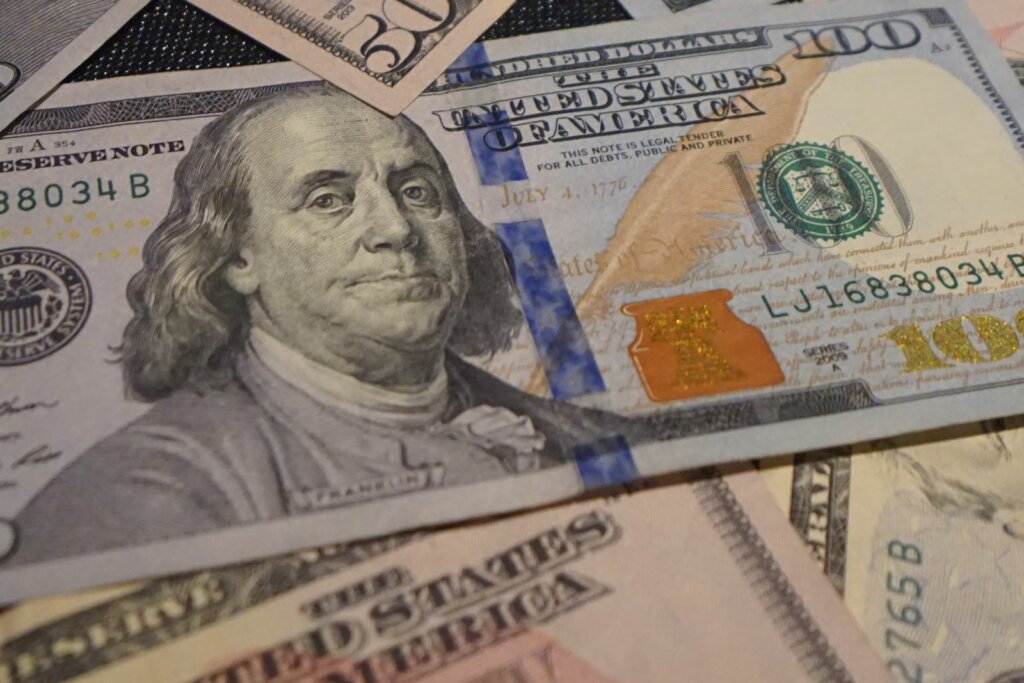
Maybe Bob Iger should be realistic. Photo by Blogging Guide on Unsplash
How about some context? Iger recently took over again at Disney and he has the potential to earn up to $27 million in 2023, his first full year as returned CEO. Let’s break that down a bit further. He is paid $74,175 per day whereas Hollywood writers earn on average $69,510 a year. Abigail Disney, a documentary producer who is also the daughter of Roy E. Disney said in a tweet, “You can only call your workers and partners ‘unrealistic’ if you cannot see beyond the confines of the very narrow and morally bankrupt business ideology that has set your company on this long track toward exploitation and injustice.”
Amen! Actor Sean Gunn had this to say about Iger’s comments: “I think when Bob Iger talks about, ‘What a shame it is,’ he needs to remember that in the 1980s, CEOs like him made 30 times more than what the lowest worker was making. Now Bob Iger makes 400 times what his lowest worker is and I think that’s a f***ing shame, Bob. Maybe you should take a look at yourself in the mirror and ask yourself, ‘Why is that?’ and not only why is that, is it okay? Is it morally okay? Is it ethically okay that you make much more than your lowest worker?”
Apparently, we as a society think it is. Iger isn’t the only CEO to make hundreds of times more than the lowest-paid worker. An article in the Guardian from a year ago found that in the top 300 U.S. companies, the wage gap is 670 to 1. CEOs are making an average of $10.6 million while the median worker is getting $23,968.
I can’t really conceptualize a million because it just sounds like a really big number. To break it down into something more understandable, 1 million seconds is approximately 11 days. How much do you think 1 billion seconds is? It’s more than 31 years. Years. Billionaires can’t possibly spend all the money they have – and you can try using the calculator https://neal.fun/spend/. Billionaires can purchase multiple mansions, make multiple movies, buy multiple yachts, purchase the Mona Lisa, and still have a lot of money left over. A LOT.

We don’t have to be so inequal. Photo by Jonathan Borba on Unsplash
No one person should have that much wealth and that’s why we need a maximum wage. We have a minimum wage, why don’t we have a maximum on how much one person can earn? I know, I know, everyone in the U.S. thinks they are temporarily embarrassed millionaires so fine, put the cap at a million dollars and make sure the lowest-paid worker is earning more too. In cooperative business models, the wage gap is much smaller. The highest-paid executive at Mondragon Corporation makes six times that of its lowest-paid employee.
Lest you think this is some kind of mom-and-pop operation, Mondragon employs around 80,000 people and its businesses include schools, a large grocery chain, a catering company, 14 technology R&D centers, and a McKinsey-like consulting firm. In 2021, the network brought in more than 11 billion euros in revenue.
You can succeed in business while also being more equitable and Mondragon is an example of that. To bring it back to the writers’ and actors’ strike, what I fear will happen is the studio execs will raise prices for consumers in order to keep lining their greedy pockets. But what I would like to happen is for our country’s artists to say, “No, Bob, you don’t get to make 400 times more than I do,” and then force a maximum wage on him. Stranger things can happen. This is Hollywood we’re talking about after all.
I dream of a world where there’s a cap on wealth. A world where one person isn’t allowed to accumulate billions while others must work multiple jobs just to survive. A world where the highest-paid worker makes no more than 10 times the lowest-paid one. A world where we remember there’s enough for everyone’s need but not enough for everyone’s greed.
Another world is not only possible, it’s probable.
Summer is a season that elicits nostalgia like none other for me. I long to recapture the lazy, sun-soaked days of my childhood when time stretched like Silly Putty. I want the carefree aesthetic portrayed in media – beach days, fireflies, and ice cream. In my mind, everything was great way back when. Except…it wasn’t.
It’s a quirk of the brain that we misremember the past and downplay negative events. We drop the bad stuff – sunburns, rain, fights with loved ones – and only remember the highlights. When we do remember the bad stuff, we reconstruct it to make whatever happened more enjoyable and entertaining. The time you broke your toe while hiking becomes more exaggerated, more colorful. It’s a yarn you trot out at parties to elicit laughter and pity. But there’s still some wistfulness about the past.
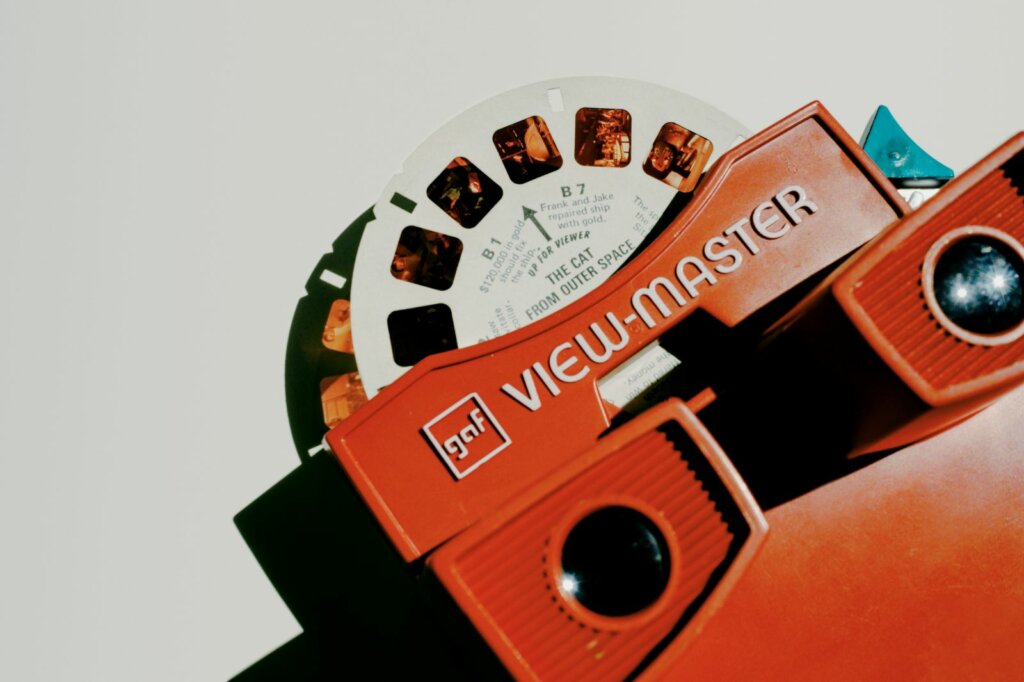
Nostalgia creates a warped view of things. Much like a view-master! Photo by Girl with red hat on Unsplash
Researchers call this “rosy retrospection” and we do this not only in our personal lives but also when we fantasize about how society was better “back then.” In a recent poll, six out of every 10 Americans said that “life for people like them is worse today than it was 50 years ago.” But as University of Calgary instructor Paul Fairie demonstrates in his Twitter thread, “A Brief History of Things Were Better 50 Years Ago,” we’ve been saying this since 1890!
To be clear, all humans do this and have always done this because it’s how our brains work. It’s not a relatively recent development dating back to 1890. We all fall into the nostalgia trap but the important thing to remember is it’s not true. There is no idyllic utopia in the past. Things were not better back then. Some of the bigger societal things like climate change and wealth inequality, yes, they were better years ago, but our day-to-day lives were not.
I put this to the test by rereading some of my journals and the time periods I thought were great were anything but. I was insecure or heartbroken or uncomfortable or not sleeping through the night. I was stuck or broke or irritated. In short, I was experiencing the entire range of human emotions because that’s what it means to be alive. There is always something stressful or bothersome happening just as there is always something fun or joyful happening.
A time when everything is perfect doesn’t exist except in snippets. We have perfect moments, hours. If we’re lucky, perfection stretches to days but never months or years. It’s just not possible because the nature of life is to change and move. It’s why my spiritual teacher says, “Here in the universe, nothing is stationary, nothing is fixed. Everything moves; that’s why this universe is called jagat. Movement is its dharma; movement is its innate characteristic.”
The best we can do then is feel gratitude for the perfect moments life grants us and keep our eyes trained ahead, not behind. One more quote from my spiritual teacher: “You are to look ahead, you are to look forward. If you look back, if you look behind, you are wasting your valuable time.” And time, as we all know, is precious.
I dream of a world where we remember that rosy retrospection is real and it’s likely we’re misremembering the past. A world where we understand things weren’t better in our personal lives five years ago or 50 years ago or 500 years ago. A world where we remember to keep our eyes trained ahead in order to avoid falling into the nostalgia trap.
Another world is not only possible, it’s probable.
The mind is a powerful thing. I’m pretty sure every spiritual tradition touches on this using different phrases such as, “magnifying mind,” “as you think, so you become,” “what you focus on grows,” etc. The question for me then is what am I focused on? Am I keeping my mind trained on greed, envy, cruelty, anxiety, fear, or selfishness? Or am I turning toward higher ideals such as love, generosity, and communion?
What’s interesting about the mind is that it’s the “cause of all our sorrows and predicaments, and it is the cause of our supreme bliss,” according to my spiritual teacher. “It is the cause of bondage, and it is the cause of liberation,” he adds. The mind is capable of both bondage and liberation and it’s up to us to direct our minds toward freedom. He has a beautiful metaphor for this and says the mind is a tat́asthá shakti.
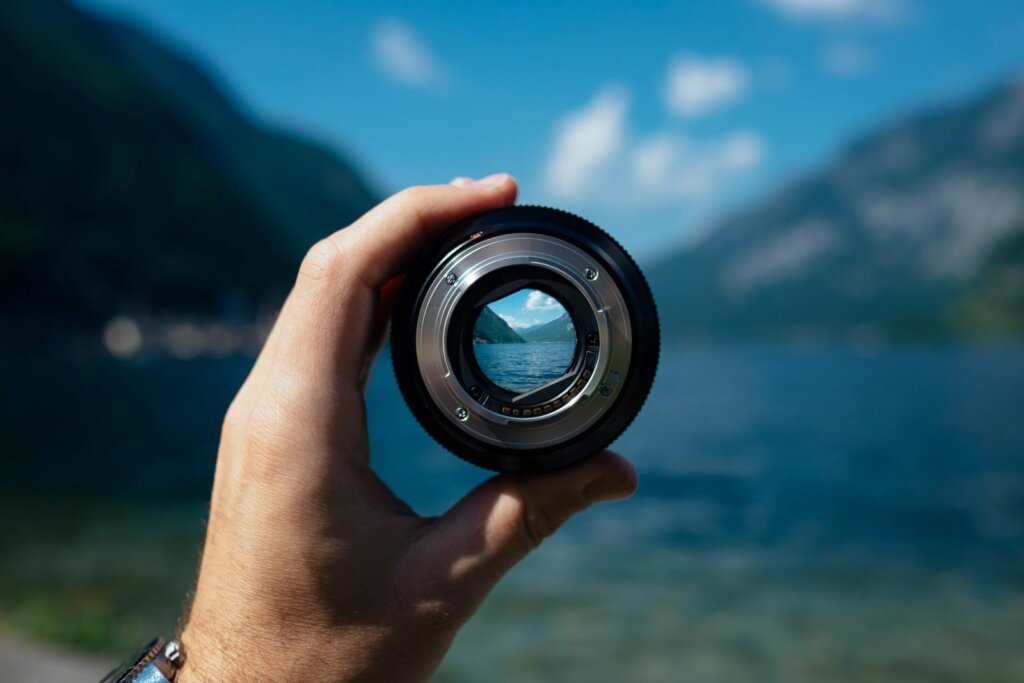
What are you focused on? Photo by Paul Skorupskas on Unsplash
Tat́a is the line where water touches land. If you move toward the water, the next moment you’ll be underwater. But if you move upward, you’ll reach dry land. The mind is like that — if it moves upward, it will be transmuted into spirit. If it moves downward, it will be transmuted into matter.
I think it’s pretty clear what we as a society focus on, where our minds are at. Take what happened recently in our oceans. When several extremely wealthy people went missing to view the remains of the Titanic, we exhausted numerous hours and resources searching for them. There was near-constant media coverage and updates. However, when a boat sank near Greece with 700 refugees onboard, we didn’t expend nearly the same number of resources or grant the same amount of media coverage.
Keep in mind, the International Organization for Migration called it one of the worst sea tragedies in the last decade. So, you know, a big deal and certainly worth covering extensively. Many people, including Barack Obama, pointed out the discrepancy so it’s not as if no one cared about the refugees but repeatedly, we’ve shown there’s a difference between lip service and action.
Many Republicans, and some Democrats, repeatedly offer “thoughts and prayers” after mass shootings but don’t actually enact change because it benefits them financially not to. They care more about lining their wallets than saving lives. I could keep going with examples but I won’t because I made my point: our society’s collective mind is moving toward the water, so to speak. It’s focused on material goods and worships at the altar of materialism. However, I know it’s not beneficial for me to focus on negativity and tout doom and gloom so I won’t. Instead, I’ll say there are pockets all over the world where people are focused on “land,” they are training their minds toward spirituality, and pretty soon, we’ll reach a tipping point.
I’ll quote my spiritual teacher again who says, “[H]uman beings should always be optimistic. The cimmerian darkness cannot retard your progress, cannot cover the light of the human heart. The spirit of your heart must move on and on against obstacles. Kick away your obstacles like pebbles from your feet – you are stronger than your obstacles.”
I dream of a world where we remember our minds are powerful and we focus them accordingly. A world where we understand the mind can either move toward bondage or liberation and the choice is ours. A world where we each focus on higher ideals and bring a better world into being.
Another world is not only possible, it’s probable.
One of the most striking things for me about being in Australia is not the accent or driving on the left side of the road, it’s their take on security. Going through airport security for domestic flights is a breeze – you leave your shoes on and there aren’t any restrictions on liquids. You’re required to remove your electronics but that’s it. Done.
When I visited the National Gallery of Victoria, I was confused because not only is the art museum free (except for certain exhibitions), there is no security check. Nobody rifled through my bag, and no one yelled at me for wearing my backpack on my back instead of on one shoulder. In contrast, the Met in New York specifically mentions both of those things on its website. Australians aren’t particularly worried about weapons because they don’t need to be.
Shortly after a mass shooting in 1996, elected officials banned semi-automatic and other military-style weapons across the country. On top of that, the federal government prohibited their import and lawmakers introduced a generous nationwide gun buyback program, funded with a Medicare tax. Many years later, lawmakers added a new National Handgun Agreement, a separate buyback act, and a reformulated gun trafficking policy to their legislative arsenal.
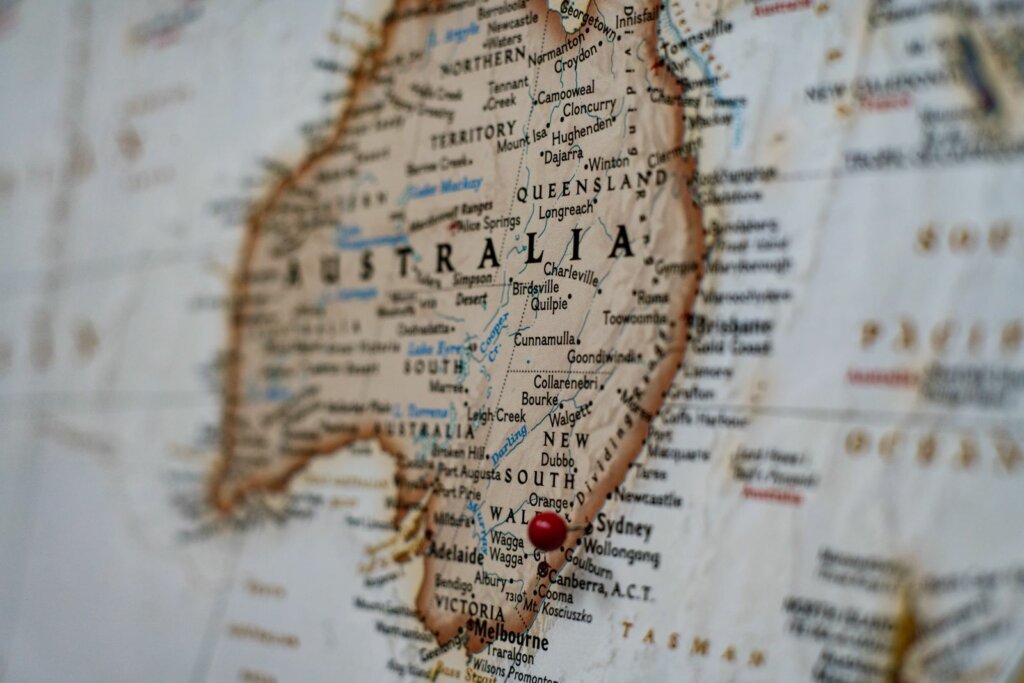
I wish the U.S. was more like Australia in some ways. Photo by Joey Csunyo on Unsplash
The result? Gun violence declined to a vast degree. In 2014, the latest year for which final statistics are available, Australia’s murder rate fell to less than 1 killing per 100,000 people. In contrast, the murder rate in the U.S. in 2020 was 6.5 killings per 100,000 people. And just in case you didn’t know, we had 647 mass shootings in 2022 alone.
People remind me the risk of being a mass shooting victim is low, statistically speaking, but you know what’s not low? The constant vigilance we live with as a society. There are reminders on public transit to say something if you see something. There are extensive security measures at the airport. We search people’s bags in certain public spaces and we have active shooter drills in schools. In other words, Americans are always on high alert for an attack, whether they’re aware of it or not.
Coming to Australia, I feel myself relax in a way I’ve never been able to the U.S. Yes, I could be stabbed, but frankly, I’d rather confront a knife than a gun. Why do we cling to our second amendment rights so fiercely? Some act as if the second amendment is a bulwark against tyranny when in reality, we’re already in a plutocracy or the reign of the rich.
The founding fathers weren’t some demigods who knew the best course of action for all of eternity. They were flawed human beings and their ideas about gun ownership are no longer relevant nearly 250 years later. How could they be? For context, at the time the founding fathers drafted the Bill of Rights, they couldn’t even conceive of indoor plumbing. Why are we still hanging our hats on their outdated ideas?
My spiritual teacher says, “Social ideals and systems should be formulated after considering the time, place, and person as well as the all-round progress of the society. It may be that something which is quite useful for a particular time, place, and person is totally worthless for a different time, place, and person. Society is not a static entity, but a dynamic one.”
Society is a dynamic entity, which means we can say, “You know what? We’re safer with fewer guns. Who cares what some long-dead white dudes said 250 years ago? Their ideas are no longer useful.” It can be done; we have a modern example in Australia and I have to tell you, I’m a fan.
I dream of a world where we remember society is a dynamic entity, which means recognizing ideas outlive their usefulness. A world where we remember we don’t have to cling to outdated beliefs. A world where we let Australia serve as an example of how to handle gun violence.
Another world is not only possible, it’s probable.
My dad told me about a TV show where people try to be the last person to survive in the woods on their own for a chance at winning $500,000. The premise is interesting because it touches on the themes of competition, human versus nature, and also resourcefulness. I get the appeal. But what I don’t get is the lengths people will go to in order to win.
One contestant swam into a frozen lake in an attempt to catch some fish knowing she’d get hypothermia. She explicitly told the camera she knew that would happen. The woman could have tapped out of the show at any time and said, “You know what? The $500,000 isn’t worth it. Take me to the grocery store,” but she didn’t. She literally risked her life all for what? Money. Money that frankly won’t last very long considering the rate of inflation.
Desperation is real and it pushes people to do things they otherwise wouldn’t. But this woman wasn’t a member of the Donner party, starving to death in the middle of winter. She was in a situation of contrived and self-inflicted desperation. I don’t fault this woman; I don’t know her or her story. She made her choice freely. No, instead what I fault is the toxic worldview pervading our society that lauds this sort of decision: materialism.
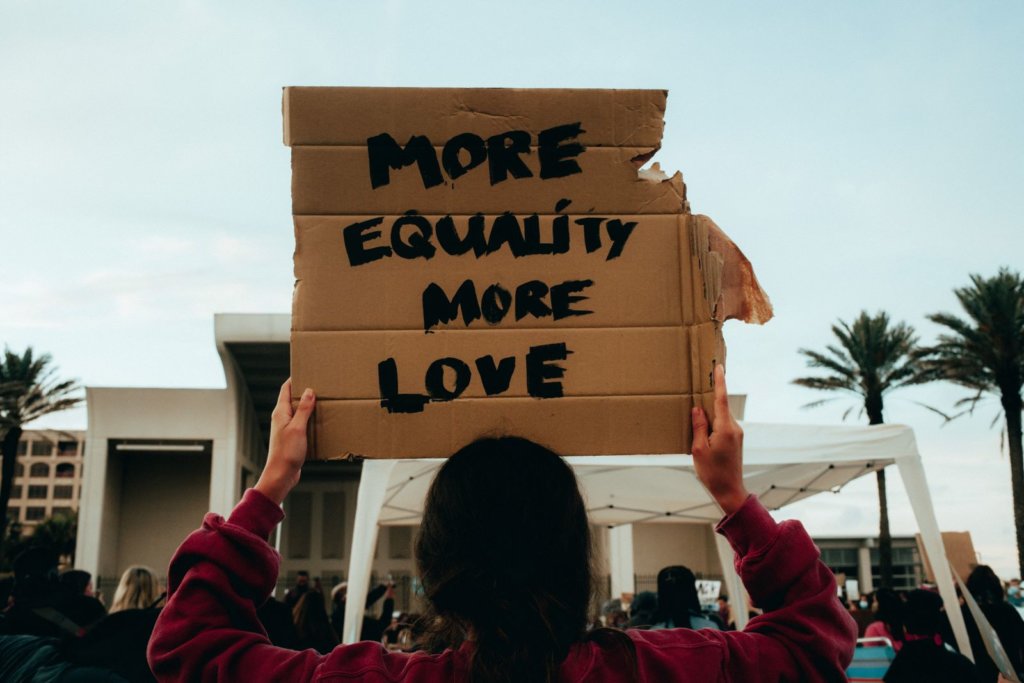
I agree! More equality, more love! Photo by Cody Pulliam on Unsplash
My favorite summary of materialism comes from a friend who says, “Under materialism, only matter matters.” Exactly. In a materialistic society, money and possessions are more important than love, community, and life. Not everyone is willing to become hypothermic for cash, but over and over again, we demonstrate human life isn’t worth more than money in indirect ways: child labor, exploitative working conditions, polluting the environment, etc. We are poisoning and killing one another for something ephemeral.
I’m not here to say money is unimportant because that’s a lie. It is important, but it’s not the only thing that matters. The worldview I use stems from tantra and my friend sums it up by saying, “Under tantra, everything matters.” What he means is matter matters. People matter. The environment matters. Spirituality matters. Under tantra, you take it all into account. Money is not the bottom line every time.
We take it for granted that materialism is the only way to operate in the world but it’s not. It’s a belief system and belief systems can change. A little religious inspiration for you that’s appropriate considering this time of year: Hanukkah isn’t really a story about oil lasting for eight days. It’s the celebration of people unifying against oppression and winning.
A quick recap: Judah and the Maccabees revolted against Syrian King Antiochus in 160 BCE. He enacted a series of harsh decrees against the Jews, including forcing them to give so much of their crops to the Syrian ruling class, the Jews had trouble feeding their families. Jewish worship was forbidden; scrolls were confiscated and burned. Sabbath and dietary laws were prohibited under the penalty of death. This small group of Jewish rebels fought against an army of thousands of men and won.
My rabbi, Michael Lerner, says, “Hanukkah is not just about having a response to the consumption craze around Christmas, it is about affirming a different worldview, a hopeful worldview. [It’s] about replacing cultures of domination with a culture of love and justice.”
We already have examples of worldviews toppling. We know it can be done because it’s been done before. We don’t need to keep operating as if materialism is the only game in town because it’s not. There’s another way to live, a better way. One in which we recognize the importance of bodies, minds, and spirits.
I dream of a world where we topple materialism. A world where we say, “No, materials are not the most important thing in existence.” A world where we recognize the existential value of all life forms. A world where we replace a culture of domination with one of love and justice.
Another world is not only possible, it’s probable.
Artificial intelligence (AI) has been on my mind because as you’re likely aware, the Lensa AI app that creates “magic avatars,” or in other words digital art, went viral and jumped to number one in the Apple App store recently. Not only that, ChatGPT gained more than a million users in five days around the same time. The AI program can create A+ academic papers and Netflix-worthy scripts.
It’s both exciting and terrifying. Terrifying because as a writer and an artist I’m starting to wonder, “Will I be obsolete soon?” And sure, AI could save me a lot of time and replace the boring writing I don’t want to do anyway such as “compare and contrast the best-selling fertilizers currently on the market,” but still. When I think about AI, my stomach clenches and my whole body gets tense. If AI can do what I do, only better in some instances, what does that mean for me?
The first, obvious answer is I’m so much more than what I do. I’m not only a writer. I’m a daughter, a sister, a friend, etc. The relationships I have with people matter, a machine cannot yet replace my presence, but also the essence of who I am matters. Regardless of whether I never write another word again, I have existential value. My spiritual teacher says over and over again, “Nobody is unimportant, nobody is insignificant. Each and every existence is valuable.” So there’s that.
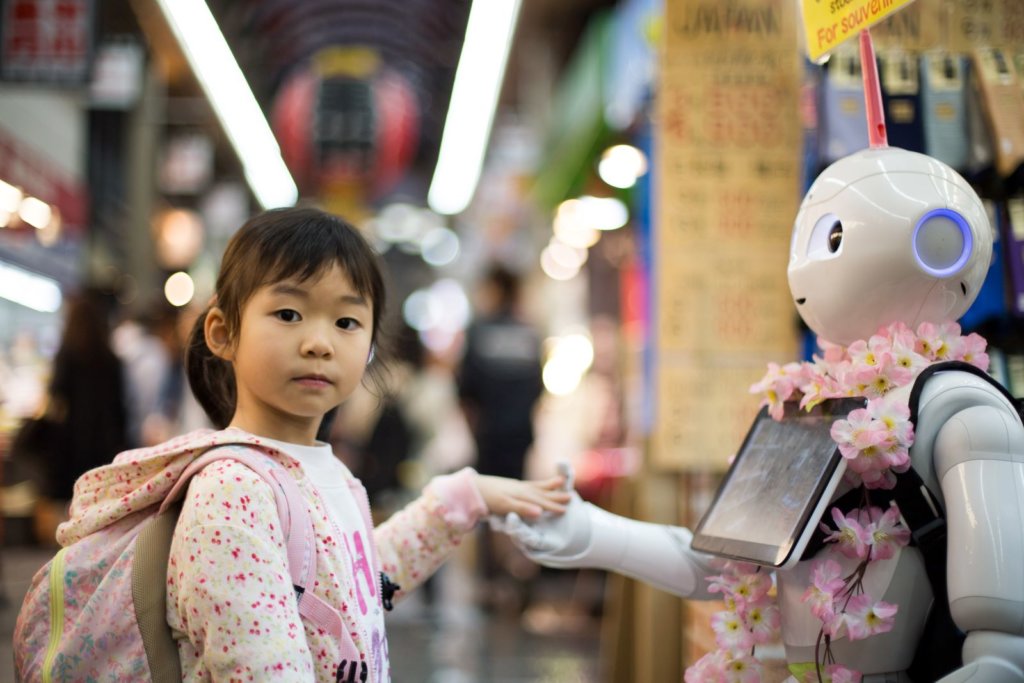
Humans and robots. More to come. Photo by Andy Kelly on Unsplash
But there’s also a more intangible something I bring. Cosmic consciousness, Brahma, Source, whatever name you have for it, is coming to know itself through me. I am in partnership with the divine to create something new. AI by its very nature is derivative. You literally have to feed AI loads and loads of information for it to “learn.” AI pulls from what’s already in existence and that is one of the criticisms of Lensa AI – it sampled from human artists without acknowledging or paying them for their work.
As a human being, I can create something new. I can be a conduit for the divine. Indeed, my spiritual teacher says artists are pioneers. They are at the vanguard of society, leading them toward “true fulfillment and welfare by providing the inspiration for service.” Art is not just about showcasing what’s inside my own head, but a way to spur people forward, to inspire, to encourage, and to hopefully put people in touch with something greater than themselves.
Another quote for you: Artists “have to cleanse all that is turbid, all that is inauspicious in individual life in the holy waters of their universal mentality, and then convey it sweetly and gracefully into the heart of humanity. Herein lies the fulfillment of their service, the consummation of their practice.”
How can AI possibly convey a universal mentality sweetly and gracefully into the heart of humanity? How can AI talk about the touch of the eternal and hint at something that lies beyond the mind when it’s not something to comprehend but rather feel and experience? It can’t. Not unless it copies a human being and therein, once again, my value is evident.
I dream of a world where we understand even if we’re all out of work, we still matter. A world where we recognize while AI is better than humans at some things, it’s not better at everything. A world where we hold true to the understanding there is still value in being human, no matter how much AI advances.
Another world is not only possible, it’s probable.
On Saturday I sat in the backseat of a car with a moon roof. I stared up at the sky and noticed a rainbow hidden in the clouds. I lowered my sunglasses because usually, that helps me see colors better but, in this case, I was surprised. Leaving my sunglasses on helped me more clearly see the rainbow. It blew my mind a little, to be honest.
We talk a lot about darkness and associate it with bad or evil things. Darkness is something to be scared of, it’s dangerous. But is that always true? Seeing this rainbow through my sunglasses reminded me sometimes darkness is illuminating. That happened for me this week not only with a rainbow but also with a better understanding of trauma.
When I first heard the news about antisemitic banners hanging over an LA freeway, my response was, “Where will I run?” That’s not rational or reasonable. No one was chasing me! Furthermore, I’ve never directly experienced antisemitism – no one has called me names for wearing a Jewish star or bullied me online. So where did this response come from? It’s a bodily memory from my ancestors.
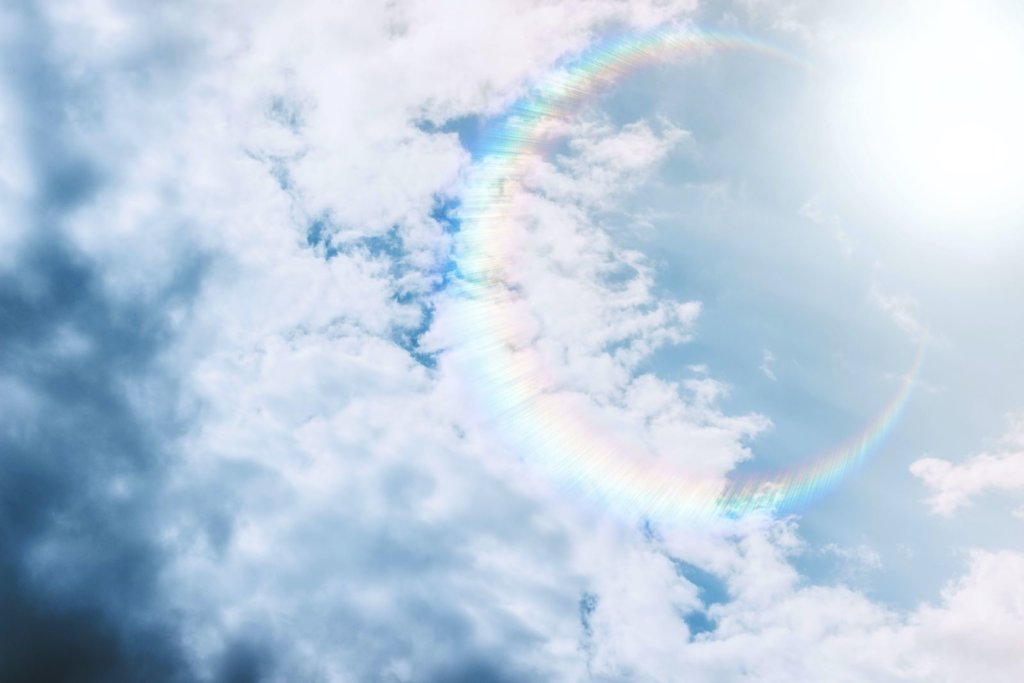
The rainbow I saw wasn’t nearly this defined but you get an idea of what I saw. Photo by Mathias Reding on Unsplash
My maternal ancestors lived in Eastern Europe and even before the Holocaust, it wasn’t free of antisemitism. I don’t know much about them, but I do know about my grandparents – both of whom were Holocaust survivors. They both had horrific experiences, but I think my, “Where will I run?” response comes from my grandmother.
During World War II, she dug her way through the ground floor of a Lithuanian ghetto and escaped via a sewer line into the woods. In other words, she ran. To my surprise, when I encounter antisemitism in places I don’t expect, like an LA freeway, that same response shows up in me. My “lizard brain” gets activated. We all have this brain, it’s our limbic system, and it doesn’t respond to logic or reason. The limbic system scans all sensory inputs and responds in a fraction of a second by letting them into the cortex, the thinking part of the brain, or initiating the fight, flight, freeze, or fawn response.
As trauma-therapist Resmaa Menakem writes in his book My Grandmother’s Hands, “This mechanism allows our lizard brain to override our thinking brain whenever it senses real or imagined danger. It blocks any information from reaching our thinking brain until after it has sent a message to fight, flee, or freeze.”
In other words, you can’t reason with your lizard brain. It just responds. What I hadn’t realized, and what I think many people also don’t understand, is that when it comes to big issues, the “isms” and “phobias” we’re facing right now, you can’t reason those away. It might work with some people to explain why racism is harmful to everybody, including white people, but if a white-bodied person feels fear or anger in their nervous system when they encounter a melanated body, logic goes out the window and racism continues.
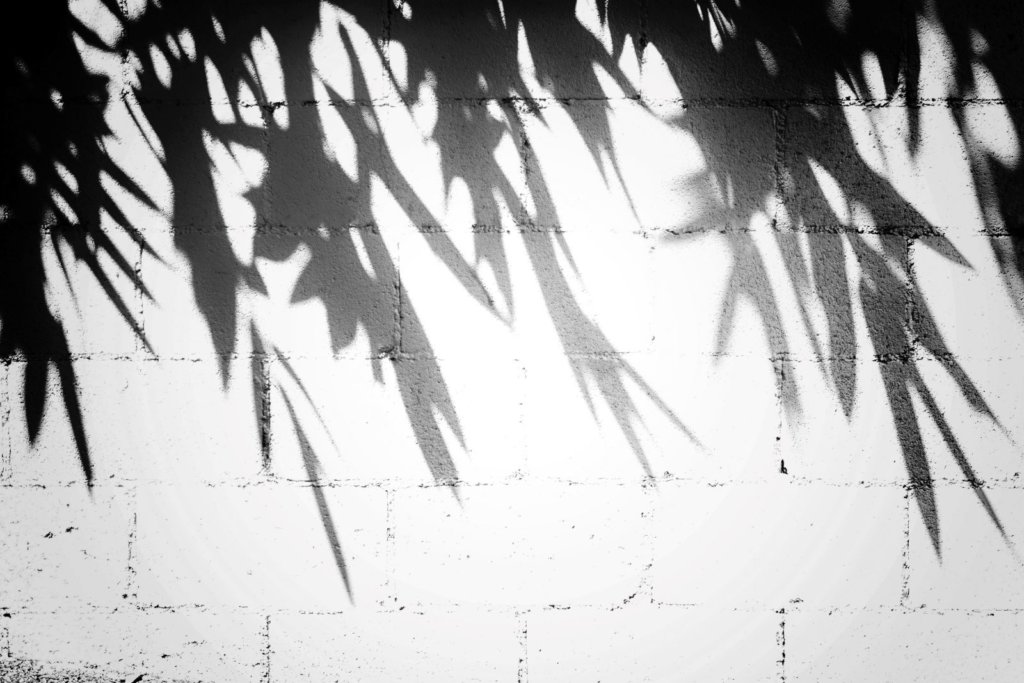
Shadows can offer a new perspective sometimes. Photo by Tim Mossholder on Unsplash
Similarly, emotional appeals will also only take you so far. Just after George Floyd’s murder, there was a surge of interest in antiracism. Emotions ran high and people purchased books and enrolled in classes more than they had before. But now, those classes and courses aren’t garnering as much interest or attention because emotion faded. But the body remembers. Menakem argues, “If we are to survive as a country, it is inside our bodies where this conflict will need to be resolved.”
After this week and experiencing my own version of alienation and othering, I agree. I can’t reason with people why antisemitic tropes are malarkey. I can’t emotionally convey why staying silent in the face of antisemitism is terrifying for me as a Jewish person. If you don’t get it, I can’t make you get it. What I can do though, is heal my own trauma.
When we do so we make room for growth in our nervous systems and that spreads. It’s like emotional contagion, but instead of emotion, something even more powerful. This isn’t a task relegated to oppressed groups, by the way. Every group has its own brand of trauma including white people. Responding with rage and aggression in the presence of an oppressed group is evidence of that.
Darkness revealed a lot to me this week. And not only a rainbow.
I dream of a world where we recognize logic and emotion only takes us so far. A world where we understand the power of trauma and create more space and peace within our nervous systems. A world where we confront our shadow to make the world a better place for ourselves and others. A world where we understand not only is light illuminating, so is the dark.
Another world is not only possible, it’s probable.
I feel unsettled after learning what happened to novelist Salman Rushdie on Friday. If you’re unaware, he was stabbed as he prepared to give a lecture in upstate New York. He suffered wounds to the neck and abdomen and is thankfully on the road to recovery, according to his agent.
It’s believed the attack is in connection to Rushdie’s late-80s book The Satanic Verses, which many Muslims consider blasphemous as it mocked or at least contained mocking references to the Prophet Muhammad and other aspects of Islam. There’s also a character based on the Supreme Leader of Iran and after it was published, Iranian leader Ayatollah Ruhollah Khomeini issued a fatwa, or edict, calling for Rushdie’s death.
I’m upset by multiple things. One, the stabbing occurred during a lecture, an event you would think was safe and peaceful. Two, multiple people were so enraged by words, not actions, words, they sought to kill someone. That’s pretty intense. And problematic because to quote Rushdie, “The moment you say that any idea system is sacred, whether it’s a religious belief system or a secular ideology, the moment you declare a set of ideas to be immune from criticism, satire, derision, or contempt, freedom of thought becomes impossible.”
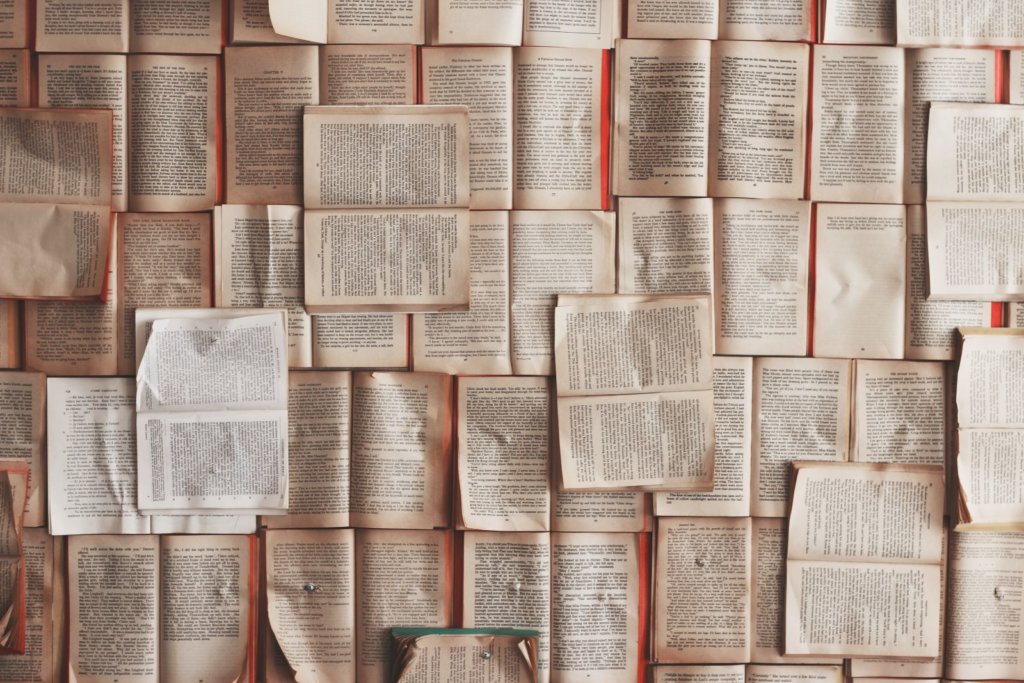
Critical thinking is key. Photo by Patrick Tomasso on Unsplash
Freedom of thought becomes impossible because instead, people sink into dogma. Dogma is thinking without logic or reasoning. And once a person does that, they start doing something because someone else told them to, which is dangerous because they can become easily manipulated by others. They fall prey to schemes and cause real harm to themselves and others.
Dogma can also be the reverse, by the way. It can be disregarding what a certain person, group, or organization says just because of their identity. My spiritual teacher says, “[D]ogma has had an extremely negative influence on ordinary people .… By arousing narrow sentiments, the adherents of dogma hope to fulfill their selfish aspirations … The followers of dogma do not want people to tread the path of rationality … The worst propounders of dogma – the kings of dogma – do not want people to develop mental clarity. They do not want the penetrating illumination of the sun’s light to pierce through the mists of dogma. They do not want people to bathe in the radiant light of the day and stand under the clear, unclouded sky.”
It’s also the case we fall prey to dogma internally, without someone acting as a puppeteer. We see this on social media with “stans,” or super fans that are overzealous and obsessive. They think the person they follow can do no wrong, and when the person inevitably makes a mistake, because, hi, they’re human, some stans dig their heels in and defend the person. People who aren’t super fans will engage in a takedown and explain why the person is trash and should be “canceled” or stop receiving support. From Merriam-Webster, “The reason for cancellation can vary, but it usually is due to the person in question having expressed an objectionable opinion, or having conducted themselves in a way that is unacceptable so that continuing to patronize that person’s work leaves a bitter taste.”
I understand that reaction and sometimes I think it’s warranted. However, this approach misses nuance. Every person is both a hero and a villain. Every person is capable of good and evil. It doesn’t make sense to follow a person as if they are an infallible, perfect human being. I know it’s funny to quote my spiritual teacher again here, but even he said, “Even if a young boy says something logical, it should be accepted, and if the Supreme Creator Brahma says something illogical, it should be rejected as rubbish.”
I agree. Use your brain. Dogma can be alluring because it’s easy and doesn’t require effort, but you have a brain and if you don’t use it, that’s not beneficial for anyone.
I dream of a world where we recognize no idea, person, or belief system is above scrutiny. A world where we don’t accept someone else’s words hook, line, and sinker, no matter who they are. A world where we use logic and reason to make the world a better place and bathe in the radiant light of the day.
Another world is not only possible, it’s probable.
